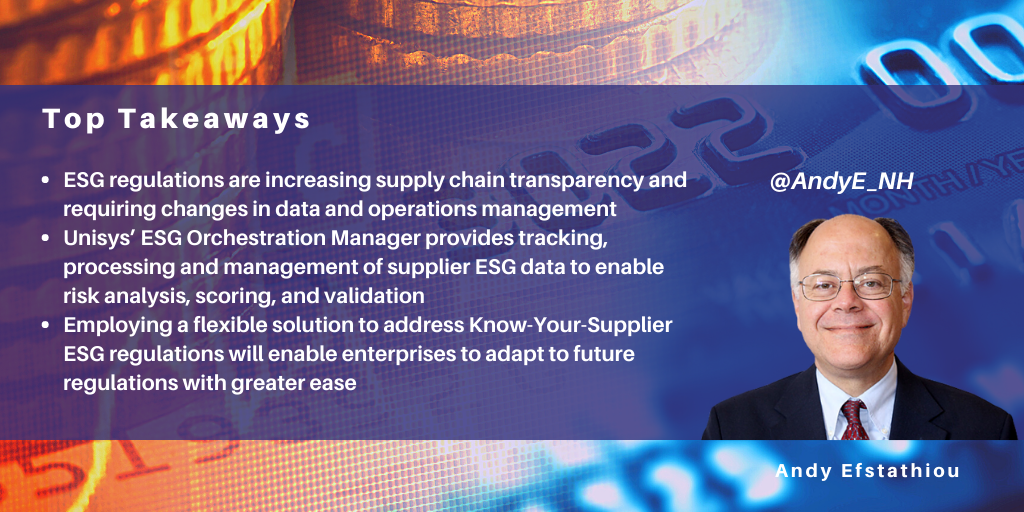Search posts by keywords:
Filter posts by author:
Related Reports
Related NEAT Reports
Other blog posts
posted on Aug 22, 2023 by Andy Efstathiou

Compliance is driving the adoption of ESG initiatives by enterprises, and currently Europe is ahead of other markets in the rigor of its ESG-related legislation and regulatory code. In this blog, I look at what Unisys is doing to make it easier for enterprises to comply with Germany’s Supply Chain Act.
Background
In 2023, several new regulations have increased compliance requirements in Europe. These include:
- Germany adopting the German Supply Chain Due Diligence Act (Supply Chain Act), effective January 2023. The law requires companies to observe basic human rights standards in their supply chains. Currently, the law covers direct suppliers. The EU is working on a law, Corporate Sustainability Due Diligence Directive (CSDDD) which will cover indirect suppliers and is applicable to all EU states including Germany; it is estimated to become effective in 2025
- The EU adopting the Corporate Sustainability Reporting Directive (CSRD), passed in January 2023, which requires EU and non-EU companies with European activities to file annual sustainability reports. These reports need to be prepared in accordance with European Sustainability Reporting Standards (ESRS)
- On January 24, 2022, the European Banking Authority announced new ESG disclosure requirements for EU banks, effective from 2023 and 2024. The requirements include disclosure of assets and activities and their exposure to climate change, customers’ and suppliers’ carbon exposure, Green Asset Ratio (GAR), effective December 2023, and Banking Book Taxonomy Alignment Ratio (BTAR), effective June 2024.
Further regulations are in the works. For example, in June 2023, the European Commission proposed regulating environmental, social, and governance rating providers that provide ESG opinions or ESG scores.
These regulations are increasing costs for all businesses and requiring fundamental data and operations management changes. It is no longer sufficient to monitor one’s operations; now, an enterprise must watch and report on third parties.
Unisys’ Approach to Compliance with the Supply Chain Act
In the past, ESG tracking solutions have been developed with individual modules for each regulatory requirement. Unisys’ approach is to build a single orchestration solution that manages the entire ESG process from a single dashboard. The ESG Orchestration Manager delivers:
- Tracking, processing, and managing supplier ESG data
- Automated risk scoring
- Supply chain transparency.
There are three components to the ESG Orchestration Manager:
- ESG portal: the supplier and whistleblower process for providing and processing relevant data
- ESG cockpit: a dashboard for managing tasks and reporting, including:
- Supplier management
- Whistleblower report processing
- Validation of risk analysis
- Risk scoring reporting
- ESG insights: provides risk scoring, social media monitoring, and digital bill of materials (DBOM), including:
- Risk analysis of suppliers
- Dashboard with geolocated supplier risk ratings
- Risk rules management
- Supply chain risk scoring
- Social media and news monitoring.
The benefits provided by ESG Orchestration Manager compared to previous approaches to ESG regulations include:
- A single solution allowing rapid compliance with this new regulation and providing flexibility to adopt new requirements into the existing solution
- Proactive use of media analysis, mitigating the risk of reputational damage
- Mitigating risk of penalties, which can run to 2% of global revenues
- Providing insights into primary and secondary suppliers
- Facilitating understanding of supply chain dependencies
- Enabling auditing of data.
Conclusion
Unisys’ ESG Orchestration Manager offering fills a need for enterprises to rapidly and inexpensively comply with the first stage of a series of Know-Your-Supplier regulations. The initial cost of compliance is high, but the ongoing cost of compliance will continue to increase.
By developing a flexible solution that can adapt to future requirements, enterprises can reduce their current and future cost of compliance while deriving useful information to drive immediate improved operational performance.
